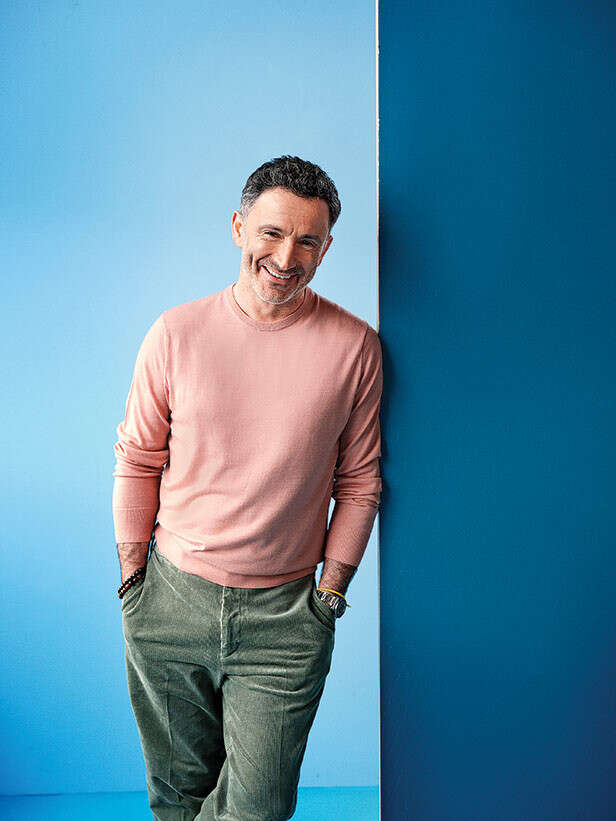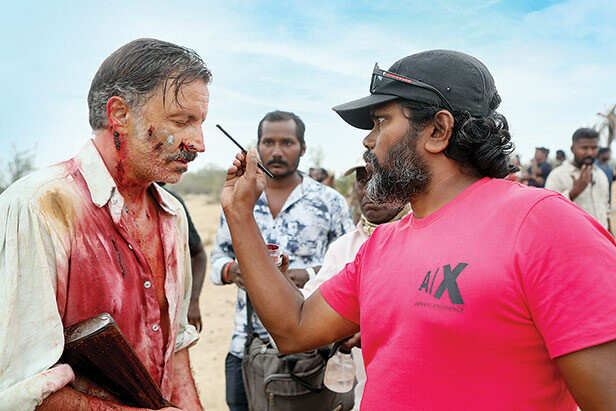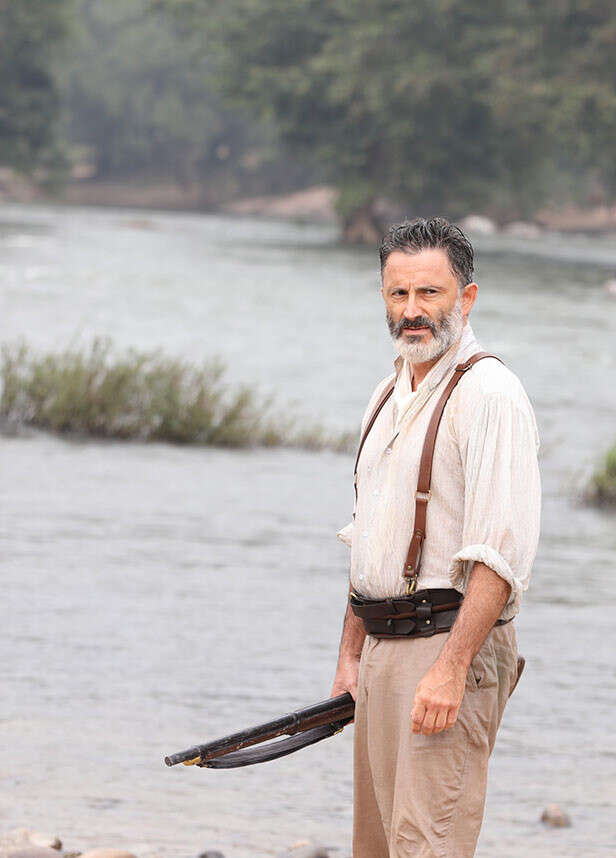Daniel Caltagirone is a distinguished English actor celebrated for his memorable performances in several acclaimed films, including The Beach, Lara Croft Tomb Raider: The Cradle of Life, and the Oscar-winning The Pianist. His career took a significant leap with his portrayal of Moon in the television series Lock Stock, a role that cemented his reputation as a prominent actor and set the stage for future successes in both film and television.
In 2002, Caltagirone collaborated with renowned director Shekhar Kapur on The Four Feathers and in 2006,
he worked with Indian-American filmmaker Tarsem Singh on The Fall. His latest project is Thangalaan, the Tamil action film directed by Pa. Ranjith, in which he shares a significant role alongside Vikram. This experience marks another exciting chapter in his career. In a candid discussion as he reflects on his Indian cinematic journey.
Excerpts:
I was born in London to Italian parents, which makes me quite different from the typical Englishman. My family is loud, loves good food, and is very animated…traits that might remind you of Indian culture. This might explain why I work well with Indian filmmakers; I understand their sensibilities and can portray British characters with an appreciation for Indian culture. Every time I visit India, I’m amazed by the warmth and the generosity of its people. They always greet me with a smile, and I love the vibrant energy, colours, and sensory experiences of the country. I feel at home here, and the welcoming nature of the people only strengthens that feeling. When I’d walk down the streets of Chennai, I’d often be greeted by name, even before the release of my film.
I do have to be cautious with Indian food, as I can easily gain weight from all the delicious dishes, especially the fried fish and sweets I enjoy. I hope to return to India soon, as I cherish my experiences here.

Tell us more about your India experience.
I ended up making incredible friends who were gracious and welcoming. I grew close to Vikram and the whole crew. We supported each other through the tough times by making each other laugh, as the work was challenging. I’ve found that in my career, the most talented people are often the nicest. Those with big egos and bad attitudes usually act out of insecurity and fear.
What was your experience of working in Pa. Ranjith’s Thangalaan.
I’ve been in this industry for a long time, and while occasionally you get fortunate with a cast that meshes perfectly, it’s not uncommon to encounter actors with big egos or challenging personalities. Navigating these dynamics, particularly when working with directors, can be quite challenging. During press junkets, it’s typical for everyone to put on a facade of harmony, but we all know that this isn’t always the reality behind the scenes. In this context, Pa. Ranjith’s approach to casting was particularly noteworthy. He dedicated a great deal of thought to assembling a diverse cast and specifically selected me for a unique role. His goal was to break away from clichés and ensure that the casting would align well with the nuances of Indian filmmaking. My primary concern was being the only British actor on the set. I wondered how my presence would influence the dynamics among my co-stars and whether they would perceive me differently.

Pa Ranjith is known to be a meticulous director, how was it working with him?
Incredible as it might seem, I agreed to take on the role without even reading the script, a first for me in my career, thanks to my meeting with Pa. Ranjith. His vision and passion were so impressive that I was compelled to explore his previous works, such as Madras and Kaala. His approach was so compelling and persuasive that I decided to trust him completely. I chose to approach the role organically and spontaneously, opting not to read the script in advance. Instead, Ranjith would describe each scene to me on a daily basis, and I performed the Tamil dialogue in English. This method proved to be remarkably effective, largely due to the strong working relationship and mutual trust we developed. Although Ranjith is demanding and pushes his actors to excel, his exacting nature made the experience both rewarding and manageable. His influence as a powerful filmmaker truly enhanced the project.And I thoroughly enjoyed the opportunity to work with him.

What was the toughest part about playing a negative character in Thangalaan?
Clement isn’t a villain in the traditional sense; rather, he is a fundamentally good man who gets corrupted
by his own desires. In the film, Vikram and I represent different facets of the same character archetype, functioning as reflections of one another. While Vikram’s character might appear villainous on the surface, the role is much more nuanced and complex. Portraying Clement presented a significant challenge, as it’s easy to fall into stereotypical portrayals. My goal was to transcend these clichés by emphasising Clement’s emotional vulnerability and showcasing his inherent goodness, particularly in pivotal scenes with Vikram. This approach was crucial to avoid reducing him to a mere British stereotype often seen in Indian films. By focusing on these subtleties, I aimed to present a more layered and authentic character.

What is your take on doing Hindi movies in the future?
I’d love to continue working in India, which feels like a second home to me. I’ve had the unique privilege of collaborating with three distinguished Indian directors—Tarsem Singh, Shekhar Kapur, and now Pa. Ranjith. Each experience has deepened my appreciation for Indian cinema. And I’m enthusiastic about the possibility of working with more acclaimed filmmakers such as Anurag Kashyap, S.S. Rajamouli, Karan Johar, Zoya Akhtar and Farhan Akhtar. While I am excited about these opportunities, I also harbour some concerns. I worry that I might be perceived primarily as a British actor, rather than as a versatile artist with a broad range of talents. I’m realistic about not necessarily landing lead roles in Indian films immediately. But my hope is that filmmakers will assess me based on my skills and contributions rather than solely on my nationality.
Do you switch on and off instantly or do characters leave a mark on you?
Many actors boast about their method acting, claiming extreme sacrifices like living in poor conditions or making dresses for their roles. Personally, I find that approach overhyped. For me, it’s about working hard and staying focused. For this role, I researched colonial history. But my method is more about maintaining focus, especially in challenging scenes. I give 110 per cent, and I’m dedicated to the role, sometimes literally, as I sustained injuries while filming. My style isn’t about dramatic sacrifices; it’s about putting in the effort and serving
the character.
Which is your favourite role till date?
That’s a tough question because all my roles have been significant. For instance, playing a crucial character in The Pianist which won three Oscars and is considered one of the top 100 films of all time, was extraordinary. Meeting the real person’s family and working on such a globally acclaimed film was deeply emotional and pivotal. However, I also view my role as Clement in Thagalaan with great importance. Although I haven’t seen the film yet, being part of an Indian movie as a parallel lead is a rare achievement for me. Regardless of the film’s outcome, it’s a memorable milestone to be involved in Indian cinema, a rare accomplishment among my Western peers.
So is there a role that you’d like to play which you haven’t done yet?
You’re asking some intriguing questions. When I was younger, I dreamed of playing James Bond, it seemed like a fun challenge. Early in my career, despite being a natural comedian, I was typecast as a dramatic leading man, so I would love to do comedy. Returning to India, I’d be thrilled to receive an offer from a prominent Indian director for a role unrelated to my British identity. It was fulfilling to be cast based on my talent and performance in Thangalaan, rather than my nationality. Fingers crossed.


